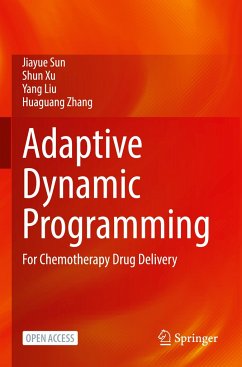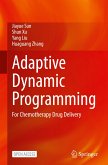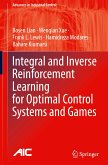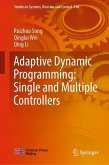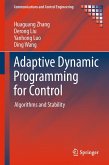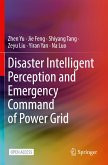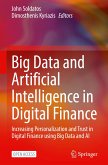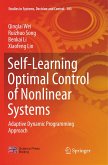- Broschiertes Buch
- Merkliste
- Auf die Merkliste
- Bewerten Bewerten
- Teilen
- Produkt teilen
- Produkterinnerung
- Produkterinnerung
This open access book focuses on the practical application of Adaptive Dynamic Programming (ADP) in chemotherapy drug delivery, taking into account clinical variables and real-time data. ADP's ability to adapt to changing conditions and make optimal decisions in complex and uncertain situations makes it a valuable tool in addressing pressing challenges in healthcare and other fields. As optimization technology evolves, we can expect to see even more sophisticated and powerful solutions emerge.
Andere Kunden interessierten sich auch für
![Adaptive Dynamic Programming Adaptive Dynamic Programming]() Jiayue SunAdaptive Dynamic Programming39,99 €
Jiayue SunAdaptive Dynamic Programming39,99 €![Integral and Inverse Reinforcement Learning for Optimal Control Systems and Games Integral and Inverse Reinforcement Learning for Optimal Control Systems and Games]() Bosen LianIntegral and Inverse Reinforcement Learning for Optimal Control Systems and Games113,99 €
Bosen LianIntegral and Inverse Reinforcement Learning for Optimal Control Systems and Games113,99 €![Adaptive Dynamic Programming: Single and Multiple Controllers Adaptive Dynamic Programming: Single and Multiple Controllers]() Ruizhuo SongAdaptive Dynamic Programming: Single and Multiple Controllers75,99 €
Ruizhuo SongAdaptive Dynamic Programming: Single and Multiple Controllers75,99 €![Adaptive Dynamic Programming for Control Adaptive Dynamic Programming for Control]() Huaguang ZhangAdaptive Dynamic Programming for Control112,99 €
Huaguang ZhangAdaptive Dynamic Programming for Control112,99 €![Disaster Intelligent Perception and Emergency Command of Power Grid Disaster Intelligent Perception and Emergency Command of Power Grid]() Zhen YuDisaster Intelligent Perception and Emergency Command of Power Grid31,99 €
Zhen YuDisaster Intelligent Perception and Emergency Command of Power Grid31,99 €![Big Data and Artificial Intelligence in Digital Finance Big Data and Artificial Intelligence in Digital Finance]() Big Data and Artificial Intelligence in Digital Finance38,99 €
Big Data and Artificial Intelligence in Digital Finance38,99 €![Self-Learning Optimal Control of Nonlinear Systems Self-Learning Optimal Control of Nonlinear Systems]() Qinglai WeiSelf-Learning Optimal Control of Nonlinear Systems104,99 €
Qinglai WeiSelf-Learning Optimal Control of Nonlinear Systems104,99 €-
-
-
This open access book focuses on the practical application of Adaptive Dynamic Programming (ADP) in chemotherapy drug delivery, taking into account clinical variables and real-time data. ADP's ability to adapt to changing conditions and make optimal decisions in complex and uncertain situations makes it a valuable tool in addressing pressing challenges in healthcare and other fields. As optimization technology evolves, we can expect to see even more sophisticated and powerful solutions emerge.
Produktdetails
- Produktdetails
- Verlag: China National Postdoctoral Program for Innovative Talents / National Natural Science Foundation of
- Artikelnr. des Verlages: 978-981-99-5931-0
- 1st ed. 2024
- Seitenzahl: 152
- Erscheinungstermin: 13. September 2023
- Englisch
- Abmessung: 235mm x 155mm x 9mm
- Gewicht: 242g
- ISBN-13: 9789819959310
- ISBN-10: 9819959314
- Artikelnr.: 68452834
- Herstellerkennzeichnung Die Herstellerinformationen sind derzeit nicht verfügbar.
- Verlag: China National Postdoctoral Program for Innovative Talents / National Natural Science Foundation of
- Artikelnr. des Verlages: 978-981-99-5931-0
- 1st ed. 2024
- Seitenzahl: 152
- Erscheinungstermin: 13. September 2023
- Englisch
- Abmessung: 235mm x 155mm x 9mm
- Gewicht: 242g
- ISBN-13: 9789819959310
- ISBN-10: 9819959314
- Artikelnr.: 68452834
- Herstellerkennzeichnung Die Herstellerinformationen sind derzeit nicht verfügbar.
Jiayue Sun received the Ph.D. degree in power electronics and power transmission from Northeastern University in Shenyang, China, under the supervision of IEEE Fellow Huaguang Zhang, in 2021. She is a postdoctoral fellow under Tianyou Chai (a member of the Chinese Academy of Engineering, IEEE Life Fellow), in the State Key Laboratory of Synthetical Automation for Process Industries, Northeastern University. She is currently a Teacher with Northeastern University. She has authored or coauthored 40 peer-reviewed international journal papers. Her current research interests include optimization of complex industrial processes, intelligent adaptive learning, and distributed control of multiagent systems. Dr. Sun is a member of the Institute of Electrical and Electronics Engineers (IEEE), the Chinese Association of Automation (CAA) and Chinese Association for Artificial Intelligence (CAAI), where she works as the Intelligent Adaptive Cooperative Optimization Control Committee's Vice Secretary-General. Shun Xu received the B.S. degree in clinical medicine, the M.S. degree in surgery, and the Ph.D. degree in thoracic surgery from China Medical University, Shenyang, China, in 1987, 1990, and 1995, respectively. He studied in Japan from 1994 to 1996. He is a chief physician, director of thoracic surgery, and director of the Lung Cancer Research Laboratory at China Medical University's Cancer Institute. He is also a national second-level professor and a doctoral supervisor. He has presided over and participated in a number of national, provincial, and ministerial level research works. His research interests include applications of reinforcement learning, convolution neural network, and pattern recognition in medical image, especially for diagnosis of lung cancer, esophageal cancer, and other thoracic tumors. Dr. Xu has been awarded the State Council Special Allowance from the State Council. He is a member of the ThoracicCardiovascular Surgery Branch Committee of the Chinese Medical Association. He serves as the chairman of the Thoracic Surgery Branch Committee of the Liaoning Medical Association. Yang Liu is a medical doctor specializing in thoracic surgery. He holds the positions of associate professor, associate chief physician, and master's supervisor for graduate students. He has authored numerous articles in both national and international medical journals, focusing on the topics of lung cancer and tumors. His research interests include reinforcement learning, adaptive dynamic programming, neural networks, and their applications in diagnosing lung diseases. Dr. Liu is a member of the Cell Biology Cardiopulmonary Rehabilitation Committee in Liaoning Province. His primary research area revolves around standardized treatment for lung cancer and mediastinal tumors. He has led a youth fund of the National Natural Science Foundation of China, and has also participated in the National Natural Science Foundation of China (General Project). Additionally, he serves as an expert for the National Natural Science Foundation Committee. Huaguang Zhang received the B.S. and M.S. degrees in control engineering from the Northeast Dianli University of China, Jilin City, China, in 1982 and 1985, respectively, and the Ph.D. degree in thermal power engineering and automation from Southeast University, Nanjing, China, in 1991. He joined the Department of Automatic Control, Northeastern University, Shenyang, China, in 1992, as a Postdoctoral Fellow, for two years, where he has been a Professor and the Head of the Institute of Electric Automation, College of Information Science and Engineering since 1994. He has authored or coauthored over 200 journal and conference papers and four monographs and has co-invented 20 patents. His current research interests include fuzzy control, stochastic-system control, neural-network-based control, nonlinear control, and their applications.
Preface.- Acknowledgements.- Chapter1 Introduction.- Chapter 2 Neural Networks-Based Immune Optimization Regulation Using Adaptive Dynamic Programming.- Chapter 3 Optimal Regulation Strategy for Nonzero-Sum Games of the Immune System Using Adaptive Dynamic Programming.- Chapter 4 Evolutionary Dynamics Optimal Research-Oriented Tumor Immunity Architecture.- Chapter 5 N-Level Hierarchy-Based Optimal Control to Develop TherapeuticStrategies for Ecological Evolutionary Dynamics Systems.- Chapter 6 Combination Therapy-Based Adaptive Control for Organism Using Medicine Dosage Regulation Mechanism.-Chapter 7 Adaptive Virotherapy Strategy for Organism with Constrained Input Using Medicine Dosage Regulation Mechanism.- References.
Preface.- Acknowledgements.- Chapter1 Introduction.- Chapter 2 Neural Networks-Based Immune Optimization Regulation Using Adaptive Dynamic Programming.- Chapter 3 Optimal Regulation Strategy for Nonzero-Sum Games of the Immune System Using Adaptive Dynamic Programming.- Chapter 4 Evolutionary Dynamics Optimal Research-Oriented Tumor Immunity Architecture.- Chapter 5 N-Level Hierarchy-Based Optimal Control to Develop TherapeuticStrategies for Ecological Evolutionary Dynamics Systems.- Chapter 6 Combination Therapy-Based Adaptive Control for Organism Using Medicine Dosage Regulation Mechanism.-Chapter 7 Adaptive Virotherapy Strategy for Organism with Constrained Input Using Medicine Dosage Regulation Mechanism.- References.

